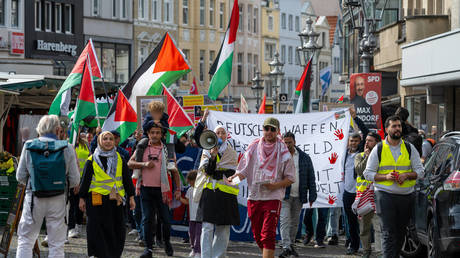
Companies are allowed to bar headscarves at work as long as it’s a general prohibition, it said
Companies in the EU are allowed to introduce headscarf bans in the workplace as long as such rules do not discriminate against specific employees, the Court of Justice of the European Union (CJEU) ruled on Thursday.
The decision comes amid the case of a Muslim woman who sued a Belgian company in 2018 after she was told she could not wear a hijab or any other kind of head covering during her internship at the firm. The employer defended its ban by explaining that it was part of the company’s neutrality policy, which prohibited workers from wearing any kind of head wear, including caps, beanies or scarfs, or religious symbols and was not targeted against anyone specifically.
In its ruling, the CJEU upheld the Belgian company’s policy, acknowledging that there was no direct discrimination in the ban.
“The internal rule of an undertaking prohibiting the visible wearing of religious, philosophical or spiritual signs does not constitute direct discrimination if it is applied to all workers in a general and undifferentiated way,” the court wrote in a press release.
The CJEU ruling comes after it announced last year that EU firms could impose a ban on hijabs or any other types of head covering as long as such a policy could be “justified by the employer’s need to present a neutral image towards customers or to prevent social disputes.”
The issue of allowing Islamic head or face coverings in the workplace or in public places has been highly contested across the EU for years and has been at the center of debate on Muslim integration into European communities.
In 2004, France, which is home to Europe’s largest Muslim community, prohibited the wearing of all Islamic head coverings in state schools and was also the first European country to introduce a complete ban on full face coverings such as the niqab and burka in public places.
Since then, similar moves have been made by Belgium, Denmark, Austria, the Netherlands, several states in Germany, Italy, Spain and Switzerland, among others.




